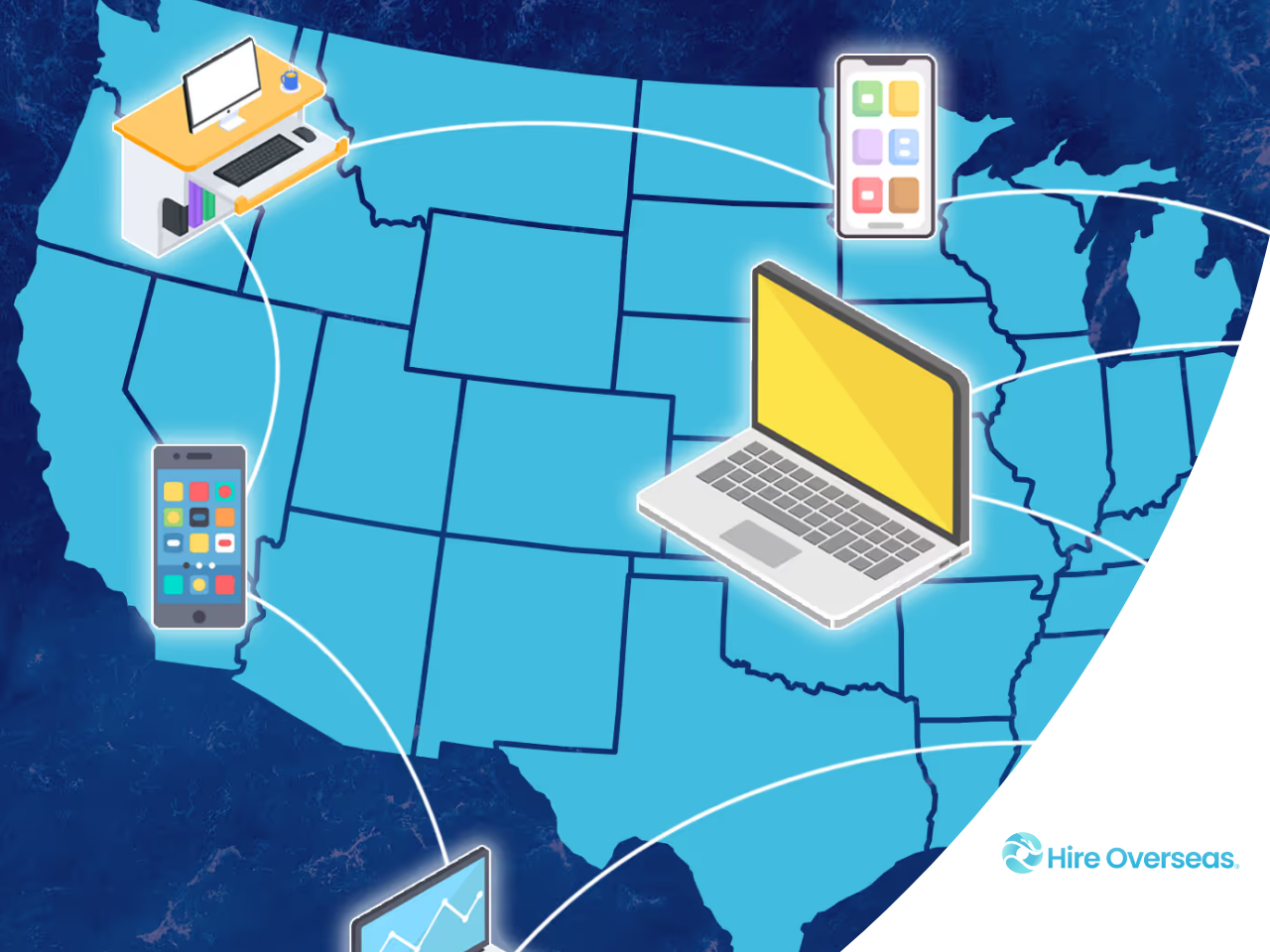Remote Work Challenges: How Employers and Talent Can Overcome Them

Remote work is no longer just an option, it’s a cornerstone of the modern workplace. For employers, it opens access to a global talent pool; for employees, it provides flexibility, autonomy, and the freedom to shape work around life. But alongside these advantages come undeniable challenges. From communication gaps and cultural disconnects to career development hurdles and data security risks, the challenges of remote work impact both organizations and professionals alike.
In fact, studies show that 21% of remote workers struggle most with loneliness, while 22% find it difficult to unplug after hours—proof that overcoming these barriers is essential for long-term success. (Buffer, 2023)
So, what exactly are the biggest challenges of working remotely—and more importantly, how can both employers and employees overcome them to build thriving distributed teams? Let’s dive in.
What Are the Main Challenges of Remote Work?
The challenges of remote work vary depending on perspective—but employers and employees often encounter overlapping struggles. To build thriving distributed teams, it’s important to look at both sides of the equation.
Remote Work Communication Challenges
For Employers
Without face-to-face interaction, communication often becomes fragmented. Misunderstandings, unclear expectations, and delayed responses create inefficiencies that slow teams down. Time zone differences further complicate collaboration, as what feels like a quick request in one region may take hours to resolve elsewhere.
For Talent
Remote employees frequently feel out of the loop when communication is inconsistent or spread across multiple platforms. Time zone gaps can leave them waiting for responses, missing live discussions, or lacking visibility into key decisions. This disconnection makes it harder to build trust and contribute fully to projects.
Isolation and Culture Gaps
For Employers
Maintaining company culture is one of the most complex challenges of remote work. When employees are scattered across locations, it becomes harder to reinforce shared values and create a sense of unity. Over time, the lack of cultural cohesion can weaken engagement and loyalty.
For Talent
Without organic social interactions, many remote professionals feel isolated. The absence of informal conversations and team bonding can lead to loneliness, disengagement, and a diminished sense of belonging.
Work-Life Balance Struggles
For Employers
When employees work irregular or extended hours, burnout becomes a serious issue. Productivity may initially rise but often declines over time, resulting in higher turnover and lower morale. Remote staff also face unique pressures at home—such as family responsibilities or constant interruptions—that can reduce focus and consistency.
For Talent
The blurred boundary between personal and professional life is one of the most common challenges with remote work. Many employees find themselves working longer hours, skipping breaks, or constantly checking emails. At the same time, household distractions and expectations from family or friends make it difficult to maintain sustained productivity.
Career Growth and Recognition
For Employers
Distributed setups make it easy to favor employees who are more visible—like those in hybrid or in-office roles—when it comes to promotions, recognition, or stretch opportunities. This creates inequity that damages trust and morale among remote workers.
For Talent
Remote professionals often worry about being overlooked, with fewer chances to demonstrate their value in person. The fear of being “out of sight, out of mind” can stall career advancement and reduce long-term commitment to the organization.
Technology and Resources
For Employers
Equipping global teams with the right tools is essential but often complex. Disparities in technology, software access, and regional infrastructure create uneven performance. At the same time, data security risks increase as employees connect from different devices, networks, and locations. Without strong safeguards, sensitive company information becomes more vulnerable to breaches.
For Talent
Not all employees have equal access to high-speed internet, ergonomic setups, or quiet working environments. These disparities directly affect productivity and job satisfaction, creating an uneven playing field. In addition, workers must navigate data security challenges themselves—balancing productivity with safe practices like managing passwords, avoiding risky networks, and keeping systems secure.
Remote Work Benefits and Challenges: Finding the Balance
Remote work is neither a perfect solution nor a constant struggle—it’s a balance of opportunities and obstacles. For both employers and talent, the key is to maximize the benefits while addressing the challenges head-on.
For Employers
Remote work creates access to a wider global talent pool, reduces office-related costs, and often improves employee satisfaction. Yet, these advantages come with challenges such as maintaining seamless communication, ensuring compliance across different regions, and creating accountability in distributed teams.
For Talent
Remote work offers flexibility, autonomy, and the chance to work with companies around the world. At the same time, employees must navigate challenges like staying connected, gaining recognition for their contributions, and setting healthy work-life boundaries.
Ultimately, remote work succeeds when both sides recognize this balance. By understanding each other’s perspectives, employers and employees can work together to overcome remote work challenges and create a model that is both sustainable and rewarding.
How to Overcome Remote Work Challenges with Practical Tips from Hire Overseas
At Hire Overseas, we’ve helped organizations across industries build, onboard, and manage remote teams around the world. Through that experience, we’ve seen one clear truth: remote work challenges can be overcome with the right systems, tools, and mindset. Here’s how both employers and talent can address the most common issues and turn remote work into a long-term success story.
1. Strengthen Communication and Collaboration
For Employers
To counter fragmented communication and time zone delays, employers should establish structured guidelines. Standardizing collaboration platforms (Slack, Teams, Zoom, Asana, Trello) and defining their purposes reduces confusion. Setting “core overlap hours” for live collaboration ensures time-sensitive work gets done while asynchronous tools handle everything else. Leaders should also schedule regular one-on-one check-ins so remote employees feel seen and included.
For Talent
Employees can stay engaged by documenting progress, proactively sharing updates, and clarifying expectations. Using async tools like Loom or project boards helps maintain visibility even across time zones. Remote workers who take initiative in communication position themselves as reliable and collaborative contributors.
👉 Read more on managing remote teams effectively.
2. Make Onboarding Intentional
For Employers
Onboarding is no longer a simple paperwork exercise—it’s the foundation of employee success. Remote hires need structured orientation programs that combine compliance, role clarity, and culture-building. Assigning a “remote buddy” or mentor can help new hires integrate faster and feel connected, while interactive onboarding sessions (rather than endless documents) make a big difference in engagement.
For Talent
Employees should approach onboarding as more than just training—it’s the perfect chance to understand company values, team norms, and growth opportunities. Asking thoughtful questions and engaging with peers early builds confidence and establishes presence within the organization.
👉 Read more on onboarding remote employees successfully.
3. Bridge Isolation and Culture Gaps
For Employers
Culture doesn’t build itself remotely—it must be intentionally designed. Employers can host regular virtual events, celebrate milestones, and encourage informal interactions to reinforce a sense of belonging. Recognition programs and inclusive rituals help distributed employees feel connected to the mission and values of the organization.
For Talent
Remote professionals should actively participate in virtual communities, team chats, or optional gatherings. Seeking connection beyond work tasks strengthens bonds and helps reduce feelings of loneliness or disconnection.
4. Support Work-Life Balance and Well-Being
For Employers
Burnout is one of the most common hidden risks of remote work. Leaders should avoid glorifying long hours and instead promote a culture of productivity over presence. This includes respecting time zones, encouraging breaks, and using workload management tools to prevent overburdening teams. Some companies also offer wellness stipends or virtual fitness programs to support employee well-being.
For Talent
Remote employees must create boundaries that separate personal and professional life. This could mean setting clear work hours, creating a dedicated workspace, or practicing a “shutdown ritual” at the end of the day. Regular breaks and mindful routines (such as walking or stretching) are essential for long-term health and productivity.
5. Foster Career Growth and Recognition
For Employers
To avoid “out of sight, out of mind,” employers should create transparent promotion criteria and ensure recognition reaches across locations. Highlighting remote employee contributions during company-wide meetings or newsletters keeps visibility fair. Virtual training programs and mentorship opportunities also ensure talent continues to grow.
For Talent
Employees should take ownership of their growth by tracking accomplishments, requesting feedback, and voicing interest in stretch assignments. Documenting results and sharing them with managers helps ensure contributions don’t go unnoticed, even from a distance.
6. Invest in Technology and Secure Resources
For Employers
Providing consistent technology and resources across regions creates equity. Employers should offer hardware stipends, invest in reliable collaboration tools, and—critically—prioritize data security. Secure VPNs, multifactor authentication, and clear cybersecurity policies help safeguard sensitive information in distributed environments.
For Talent
Remote professionals must also take responsibility for data security. This means using strong passwords, avoiding public Wi-Fi without protection, and keeping devices updated. Alongside this, ensuring access to quality internet and ergonomic setups enables both productivity and well-being.
7. Navigate Global Hiring and Resources Wisely
For Employers
Hiring internationally brings enormous opportunities but also compliance risks. Payroll, contracts, and labor laws vary across countries, making it complex for businesses to scale without support. Partnering with an expert like Hire Overseas simplifies compliance and ensures employees are treated fairly, regardless of where they are. It also helps organizations tap into talent-rich regions like the Philippines, where professionals are known for adaptability, strong communication, and technical skills.
For Talent
The global remote job market is highly competitive. To stand out, professionals should emphasize soft skills such as cross-cultural communication, adaptability, and accountability in addition to technical expertise. Demonstrating reliability and initiative helps remote workers build trust across borders.
👉 Read more on hiring remote workers in the Philippines.
The Hire Overseas Perspective:
Remote work challenges aren’t roadblocks—they’re opportunities to refine how we work, connect, and grow. Employers who build fair, supportive systems will attract stronger talent, while employees who adapt and engage will thrive in global teams. Together, this creates a sustainable model for the future of work.
Your Remote Work Success Checklist
To overcome the most common remote work challenges, both employers and talent should prepare intentionally. Here’s a quick checklist based on Hire Overseas’ tips:
✅ For Employers
✅ For Talent
💡 Checking these boxes helps both sides minimize the challenges of remote work and build a more sustainable, rewarding remote model.
Turning Remote Challenges Into Long-Term Success
The challenges of remote work are real, but they don’t have to hold you back. With the right systems, clear communication, and a focus on culture and growth, employers can build stronger distributed teams while employees can thrive in flexible, global careers.
Remote work is more than a trend; it’s the future of how we collaborate and succeed. The organizations and professionals who embrace these lessons today will be the ones leading tomorrow.
Ready to overcome remote work challenges and unlock global talent? Book a call with Hire Overseas to discover how we help companies attract, onboard, and manage world-class remote teams with ease.
FAQs About Remote Work Challenges
Is remote work less productive than in-office work?
Not necessarily. Studies show that remote employees can be just as, if not more, productive than office-based teams—provided they have the right tools, structure, and support. Productivity often depends on how well organizations set expectations and how employees manage their time.
What are some hidden costs of remote work for employers?
While companies save on office expenses, hidden costs can include technology investments, cybersecurity measures, employee stipends for home offices, and the need for virtual engagement programs to maintain morale.
Can remote work negatively affect teamwork and innovation?
Yes, without intentional collaboration, teams risk becoming siloed. However, structured brainstorming sessions, virtual workshops, and asynchronous idea-sharing tools can help foster innovation even across time zones.
Do remote employees face different tax or legal considerations?
They can. For example, working from a different state or country may trigger local tax obligations or employment law requirements. This is why many organizations partner with global HR experts like Hire Overseas to ensure compliance.
Are there specific industries where remote work is harder to implement?
Yes. Sectors requiring physical presence—like healthcare, manufacturing, and logistics—face greater barriers. However, support functions such as IT, HR, accounting, and customer service within these industries can still operate remotely with the right systems.
Can remote work opportunities improve employee retention?
Absolutely. Flexibility is now a top priority for professionals worldwide. Companies offering remote options often enjoy higher retention rates, as employees value the autonomy and work-life integration it provides.
Browse Categories
Unlock Global Talent with Ease
Hire Overseas streamlines your hiring process from start to finish, connecting you with top global talent.





